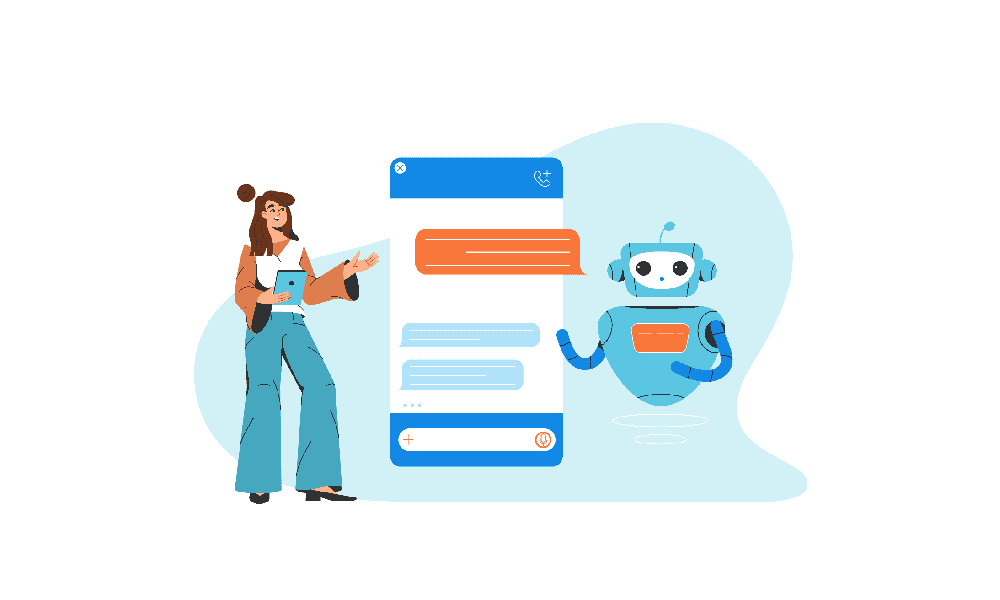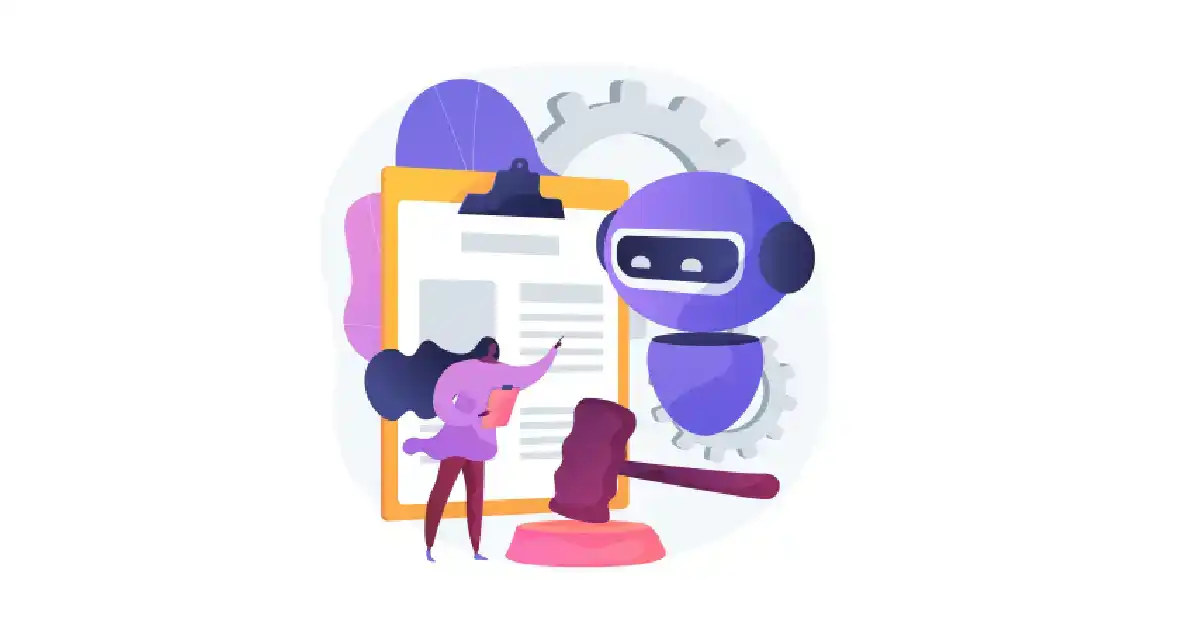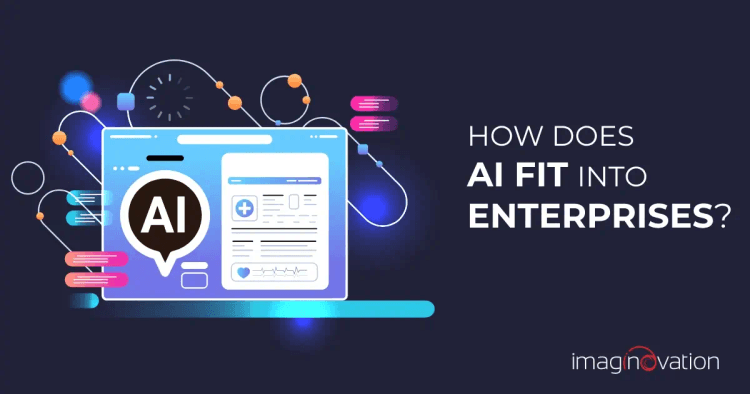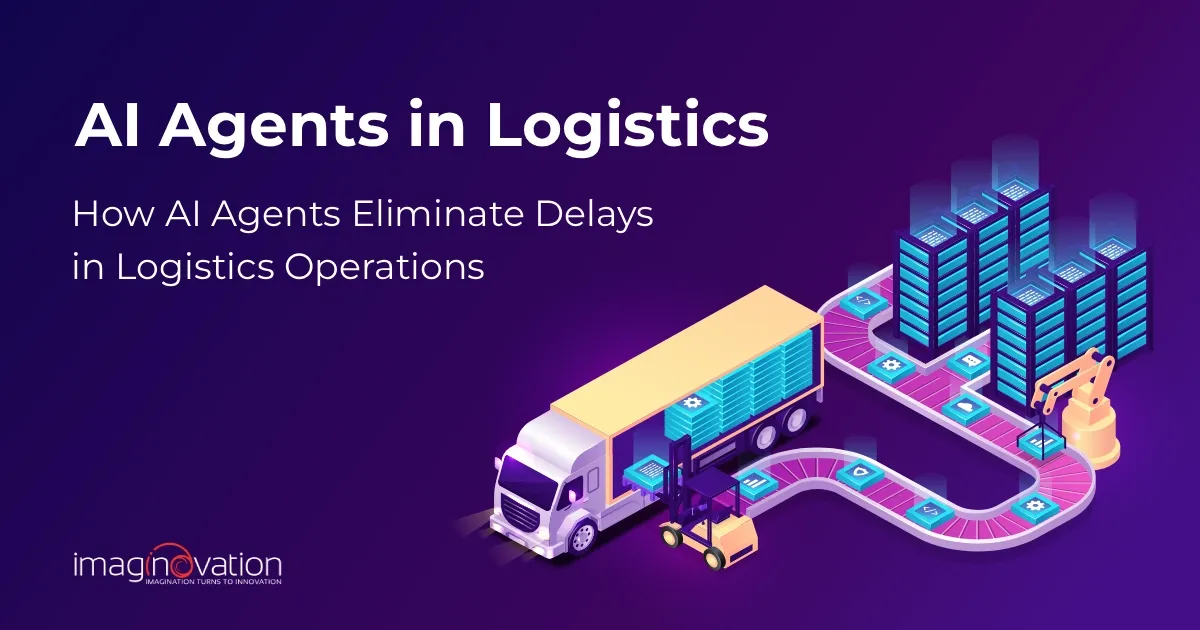To estimate the cost of building a website or an app, use our app cost calculator tool.
Envision a business trapped in slow, manual processes and data chaos. With such outdated practices, how can it survive in today's fast-paced markets?
The answer lies in adopting Artificial Intelligence (AI).
Without AI, companies remain overly dependent on manual operations; consequently, operational inefficiencies mount, costs soar, and scalability remains a distant dream.
By integrating AI technologies like machine learning, robotic process automation, and predictive analytics, enterprises can automate tasks, reduce errors, and make fast, data-driven decisions.
While many laud AI in enterprises for its transformative potential, many businesses still struggle to integrate AI effectively.
Where does one begin on this AI journey? What type of enterprise AI solution is needed to improve your business performance? How can your business thrive with AI adoption?
This article delves into the answers to these questions.
Let’s read on!
Understanding AI in Enterprises
AI is a branch of computer science that allows computers to do things once done only by humans, like thinking, reasoning, recognizing speech, learning, making decisions, and solving problems.
It allows machines to understand and interpret their surroundings and learn from experience, such as how self-driving cars operate, how content is generated, or how devices use facial recognition for security.
AI includes many technologies like deep learning, machine learning, and natural language processing (NLP). Each AI technology is progressing on its own, but when combined with other tools like analytics and automation, it can completely transform how businesses operate.
How Does AI Work?
AI systems begin by gathering data in the form of speech, text, or images. When this is done, they use rules and algorithms to process it, make predictions, and take actions based on the input. AI operates through five key steps:
- Input: Data is gathered from different sources and categorized.
- Processing: The AI analyzes the data using learned patterns to identify similarities.
- Outcomes: It uses these patterns to make predictions.
- Adjustments: If the data is deemed a failure, AI learns from its mistakes and tries again under different conditions.
- Assessments: This continual learning process allows AI to improve constantly.
Fundamental Components of AI
- Learning - Learning in AI is just like human knowledge acquisition but is done computationally. A key aspect involves trial-and-error, where the system explores solutions and retains successful strategies.
- Decision-making - AI utilizes reasoning to analyze information and make decisions. This process involves drawing inferences from given situations, which can be categorized as either inductive or deductive.
- Problem-solving - AI's problem-solving capability encompasses techniques such as planning, searching, and optimization. Problem-solving in AI involves systematically reducing the disparities between the current state and the desired goal state.
- Language processing - In AI, language processing includes understanding and generating natural language. Techniques such as natural language understanding, machine translation, and text generation empower AI to interact efficiently with language.
Relevance of AI in Modern Enterprises
AI has revolutionized how we work, live, and engage in activities. Its impact on various aspects of our lives is truly transformative.
That's why AI has become an indispensable asset in modern enterprises. This technology has proven incredibly effective in automating tasks traditionally handled by humans, like customer service, fraud detection, and quality control.
In tasks requiring precision and attention to detail, AI surpasses human capabilities. For example, AI tools can swiftly analyze large volumes of legal documents with minimal errors, providing accurate information. AI's capacity to process vast datasets uncovers valuable insights into business operations, revealing aspects that may have otherwise gone unnoticed.
- According to Gartner, in 2015, a mere 10% of organizations were either using AI or considering its implementation in their plans. However, by 2019, this percentage had skyrocketed to an impressive 37%, showcasing AI's accelerated adoption (270%) across industries.
- According to Grand View Research, the rapid expansion of AI shows no signs of slowing down anytime soon. Global organizations are projected to adopt AI at a CAGR of 36.6% from 2024 to 2030.
- Another survey indicates that 85% of executives believe utilizing AI services is necessary for their companies to obtain or retain a competitive edge in the marketplace.
The widespread adoption of AI is reshaping various industries, demonstrating how businesses leverage its capabilities to gain a competitive edge. For example, a study revealed that Marketing and sales departments prioritize AI and ML tools to drive market revenue success 40% more than other industry departments.
By embracing AI technologies, modern enterprises are not just keeping pace with technological advancements; they are also reaping the tangible benefits of heightened productivity, innovative product development, and enriched customer experiences.
Types of AI Solutions for Enterprises
Here are the various types of enterprise AI solutions businesses use or plan to build intelligent systems.
1. Narrow or Weak AI
Narrow AI is tailored for specific tasks like speech recognition, image classification, and recommendation systems. It shines in its designated area but doesn't match human intelligence in general.
2. General or Strong AI
General or Strong AI is an AI solution designed to perform any intellectual task that human beings can. This type of AI solution possesses cognitive abilities and can learn, think, and apply rules of logic like a human being.
3. Expert Systems
These AI solutions mimic human decision-making by following predefined rules and logic based on expert knowledge. Expert Systems are usually crafted to tackle complex problems using their extensive knowledge base. They are used in sectors like healthcare or finance, where accurate and timely decisions are crucial. Expert Systems are of three types:
- Rule-based systems: These systems make decisions based on a specific set of rules.
- Fuzzy systems: They handle vague and incomplete information using logic.
- Neural networks: These systems rationalize decisions with algorithms inspired by the human brain.
Benefits of Integrating AI in Enterprises
Integrating AI into daily business operations has the potential to provide practical enterprise AI benefits. These benefits directly tackle the difficulties encountered by modern businesses. Here are 6 reasons why your business must invest in enterprise AI solutions.

1. Automates Workflows and Increases Efficiency
AI reduces human workload by automating routine and repetitive tasks, saving time and manpower. This empowers employees to focus on essential matters, adding greater value to your business and boosting productivity. For instance, AI-powered chatbots handle basic inquiries, freeing your staff to address complex customer issues. Additionally, AI aids in market research and presents data comprehensibly for decision-makers.
2. Cuts Down Operational Costs
AI offers substantial cost savings by efficiently automating routine tasks. For example, finance teams leverage AI-driven automation to streamline invoice processing, expense management, and financial reporting tasks. Companies integrating AI in their financial operations often achieve significant reductions in operational expenses, potentially saving millions annually.
3. Improves Customer Experience
Integrating AI into businesses personalizes customer interactions by leveraging their data. By analyzing customer information, AI predicts needs and provides tailored responses, enhancing satisfaction and loyalty. AI-powered virtual assistants and chatbots also ensure 24 x 7 customer support and information availability.
4. Boosts Revenue
Predictive analytics offered by AI helps businesses identify potential sales opportunities based on customer demographics and behavior patterns. AI algorithms analyze historical sales data to forecast future trends, enabling enterprises to optimize pricing strategies. Studies show that companies using AI increase revenue by improving sales forecast accuracy.
5. Optimizes Inventory Management
AI helps businesses forecast demand accurately, minimizing overstock and stockouts. This boosts turnover rates, lowers holding costs, and improves operational efficiency in the inventories. Companies using AI in stock management benefit from reduced costs and improved turnover rates, thus enhancing operations. It is one of the key AI benefits for businesses.
6. Improves Staffing Hiring Process
Incorporating AI in recruitment helps evaluate candidates and predict employee turnover. Entrepreneurs and CTOs who adopt AI see better employee retention and lower hiring costs. AI optimizes recruitment strategies, leading to higher employee satisfaction and longer tenure.
Also Read: How to Integrate ChatGPT in Business Applications
Key AI Sub-technologies Impacting Enterprises
To get the most out of your AI investments, it is crucial to know the key sub-technologies impacting AI enterprise software development. Some of the prominent sub-technologies include:
1. Machine Learning
Many enterprises utilize machine learning as the primary technology in their artificial intelligence applications. This sub-technology helps build systems that learn continuously from data, recognize patterns, and predict without explicit programming. ML systems can autonomously analyze data, discover patterns, and make intelligent decisions based on the learned knowledge.
2. Deep Learning
This subset of ML excels in tasks like image and speech recognition. It draws inspiration from the human brain and utilizes artificial neural networks (ANNs). These networks are influenced by the flow of information, leading to structural changes based on input and output.
3. Natural Language Processing
Natural Language Processing (NLP) focuses on communication between human languages and computers. Through NLP, computer programs can interpret and produce human speech. NLP plays a significant role in customer service interactions, support systems, and transactional processes. Apple's virtual assistant Siri, Google Translate, and Gmail Smart Reply are all examples of NLP solutions.
4. Generative AI
Generative AI is becoming popular for creating content like text, images, and code in enterprises. It automates creative tasks, helping businesses develop marketing strategies, enhance customer engagement, and streamline content creation. Using Generative AI, companies can personalize interactions, speed up time-to-market for new ideas, and boost creativity and innovation.
5. Computer Vision
These AI solutions interpret visual information from images or videos, allowing tasks like object recognition and image classification. This essential component enables AI algorithms to recognize objects that the machine "sees" and then respond accordingly. These applications are used in facial recognition, autonomous driving systems, and medical imaging.
6. Robotics
Robotics technology automates challenging and hazardous tasks as well as routine and high-precision tasks. For example, robots move items around the warehouse's premises to fulfill deliveries, or robotic surgical systems perform minimally invasive surgeries that are impossible with humans alone. Robotics AI solutions control robots to perform tasks in various industries.
Challenges and Considerations in Implementing AI
As businesses embrace AI for its vast potential, they must also grapple with challenges around ethical considerations, job displacement, and regulatory issues. That’s why navigating the adoption of AI technologies calls for a careful strategy to harness benefits while minimizing risks.
Here are some of the key challenges and considerations that businesses encounter on their AI adoption journey:
1. Data Quality and Availability
AI relies on data. Many businesses struggle to acquire clean and relevant datasets needed for training AI models. Data is often scattered across various departments and requires extensive cleaning before integration, leading to significant time and resource investment.
Moreover, poor data quality results in flawed predictions. For example, if a company's AI system is trained on incomplete and outdated data, it may generate unreliable recommendations.
To overcome this challenge -
- Implement data quality management practices such as cleansing, validation, and documentation. This ensures the accuracy and relevance of data used for AI training.
- Prioritize data privacy by complying with regulations like GDPR and implementing secure data storage and handling protocols.
2. The Dearth of Skilled Talent
A lack of data scientists or AI engineers can hinder a company's ability to build and maintain effective AI models. The demand for AI professionals has skyrocketed, with job postings in the field surging over 300% in the past few years. However, this growth has outpaced the rate at which the workforce is acquiring the necessary AI skills.
This shortage of skilled AI talent stems from the rapid advancement in AI tech, the high demand for AI talent, and the interdisciplinary nature of AI.
To overcome this challenge -
- Invest in talent development by conducting AI training programs for existing employees.
- Recruit AI specialists.
- Foster collaboration with external AI consulting firms.
3. Ethical and Regulatory Concerns

AI technology raises ethical and regulatory concerns about data privacy, bias, and transparency. Non-compliance with regulations often results in legal issues and reputational damage, while ethical concerns can erode customer trust.
For instance, if an AI system used for recruitment inadvertently perpetuates gender or racial biases, it can lead to discriminatory practices and legal repercussions.
To overcome this challenge -
- Address ethical issues such as bias in AI algorithms.
- Establish clear ethical guidelines.
- Implement data privacy measures.
- Stay abreast of evolving regulations.
4. Integration with Legacy Systems
Legacy systems in a company act like old yet sturdy pillars that provide support. However, when it comes to modernization with technologies like AI, these systems become quite a challenge to deal with.
Their outdated technologies often don't align well with AI or cloud storage. This creates roadblocks during integration, hampering the flow of data and communication between systems. Additionally, data silos within legacy systems hinder productive AI-driven insights.
To overcome this challenge -
- Conduct a comprehensive system audit to identify compatibility challenges.
- Implement data cleansing processes to enhance the quality of existing data.
5. Scalability Issues
Scaling from prototype to full-scale implementation of AI solutions poses a major challenge. While AI solutions might work effectively on a smaller scale, they often fail to scale seamlessly when applied in real-world scenarios involving large datasets or complex variables.
For example, a machine learning model performs well in a controlled test environment with a small dataset but struggles to maintain the same level of performance when deployed in a large-scale production system with huge volumes of diverse data.
To overcome this challenge -
- Invest in robust storage and retrieval systems for handling diverse datasets.
- As more people start using AI solutions, ensure its consistent performance isn't compromised.
6. Vulnerability to Cyberattacks
In today's digitally connected world, cyberattacks pose a significant threat to businesses. When a business relies on AI systems, it becomes even more vulnerable to cyber crimes.
One reason AI systems may be more vulnerable to cyber attacks is the potential for attackers to manipulate the behavior of these systems.
To overcome this challenge -
- Keep updating your AI solutions with recent algorithms to tackle all kinds of cyberattacks.
Real-World Applications of AI in Enterprises
Artificial intelligence (AI) has moved beyond just a trend; it now plays a vital role in our daily lives, reshaping every aspect of society beyond our imagination.
Here are some incredible real-world applications of AI spearheading change and transforming industries.
1. Healthcare - Revolutionizing Medical Diagnosis & Treatment
PathAI’s AISight is a cloud-native intelligent enterprise workflow solution widely used by leading laboratories and research centers.
It enhances digital pathology workflows and supports advanced AI applications. AISight is a central hub for managing cases, handling images, and integrating best-in-class AI tools.
This comprehensive platform enables multiple histopathology use cases, such as analyzing tissue samples, diagnosing diseases, and streamlining laboratory operations. By leveraging AISight, labs can improve diagnostic accuracy and increase efficiency in the field of pathology.
2. Automotive - Self-Driving Cars
Cruise, a subsidiary of General Motors, pioneers self-driving cars.
By harnessing vast data sets encompassing road layouts, location, traffic patterns, vehicle performance, and rider behavior, the company leverages AI to convert this data into actionable insights.
This eventually enables the seamless operation of driverless cars.
Thus, Cruise's reliance on AI technologies ensures that their self-driving cars can make swift decisions and operate safely and efficiently on the roads, transforming automotive industry.
3. Finance - Analytics Product
Kensho NERD is an innovative AI-powered financial research solution aiming to help investors make informed decisions.
Kensho NERD leverages advanced machine learning algorithms to analyze vast amounts of unstructured financial data, make predictions, and generate insights that facilitate effective decision-making about investment strategies.
The platform is capable of dissecting complex financial concepts and data from multiple sources and presenting them clearly and concisely. Because of its amazing data analysis capabilities, it is widely embraced by investors and financial institutions.
4. Beauty - Virtual Makeup Assistant For the Visually Impaired
Estée Lauder's Voice-enabled Makeup Assistant is an AI-driven tool designed for the visually impaired.
This app, available on iOS, provides audio guidance for applying foundation, eyeshadow, and lipstick, making the beauty experience more accessible.
It's a step forward in enhancing the accessibility of Estée Lauder's offerings, ensuring that every individual can feel confident and beautiful when using our makeup products.
Transform Your Enterprise with AI Solutions from Imaginovation
AI is now as crucial as the Internet, making its integration vital for business success. While challenging, the rewards of AI include better decision-making, increased efficiency, and improved customer satisfaction.
That’s why overcoming AI complexities can give your business a competitive edge.
Imaginovation specializes in web app development and tech consultation, focusing on building enterprise AI solutions.
Our experienced team creates cutting-edge AI and Machine Learning solutions customized to your business needs. From conception to implementation, we ensure top-notch performance, security, and user experience for our AI apps.
Whether it's AI-driven data analytics, natural language processing, RPA, or computer vision, we're here to help you leverage AI technology to enhance your business and achieve your goals.
Contact us and get started on your AI adoption journey.
Let’s talk.











